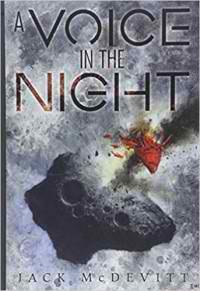A Voice in the Night by Jack McDevitt
 Sunday, May 5, 2019 at 5:59AM
Sunday, May 5, 2019 at 5:59AM 
Published by Subterranean Press on August 31, 2018
Jack McDevitt is at his best with space opera. His novels about explorers or traders roaming the galaxy always convey a sense of realism that is missing from military science fiction and Star Wars clones. As this short story collection shows, McDevitt has a wider science fiction range, but I still like his space opera more than his other efforts. My favorite McDevitt novels star Alex Benedict. I was therefore happy to read “A Voice in the Night,” which introduces Benedict as a teenager who persuades his archeologist uncle to track down the radio waves of the final broadcast of a comedian who died in space.
McDevitt’s other major series of novels (the Academy series) features Priscilla Hutchins. “Maiden Voyage” is a prequel to his Hutchins novels. The story balances the wonders and perils of discovery as Priscilla takes a qualification flight to get her pilot’s license. Another story about Priscilla’s training (“Waiting at the Altar”) involves a distress signal and a first contact that has been lost to history.
In “Oculus,” another character from the Academy series, Kellie Collier, finds herself and her passenger in a pickle when their ship loses power while trying to remove an ancient civilization’s books from the moon where they were stored. The story (one of my favorites in the collection) asks in a rather thrilling way whether a dedication to knowledge can at some point become foolish.
One of the more substantial stories in the volume, “Lucy,” imagines that a space ship has gone missing. Characters debate whether to send a rescue ship operated by the same latest-generation AI, or one operated by the previous generation AI that has a proven track record. The AIs, of course, have their own opinions. The story incorporates old themes (whether there is a political will for space travel, whether AIs are capable of developing emotions), but the story has a new take on the concept of technological obsolescence and how sentient technology might respond to it.
“Blinker” is another good story. Two people who are trapped in a moon base use their ingenuity to survive. As they debate whether robots should take the risk of space travel rather than humans, they realize that humans have a survival instinct and cleverness that robots lack. In one of the most interesting and well-written stories (“Friends in High Places”), God changes history to save Jesus from being crucified.
In a twist on the science fiction cautionary tale, “Good Intentions” imagines a game played by a “solve the mystery club” in which the mystery is crafted by a science fiction writer who wants the participants to resolve, not just a mystery, but a pair of ethical dilemmas. As a good mystery should, the story takes a surprising twist at the end. “Molly’s Kids” is another surprising story about people at NASA who try to trick an AI into doing something it doesn’t want to do.
“Searching for Oz” is a first contact story about aliens who enjoy Jack Benny’s radio show. “Listen Up, Nitwits” is a first contact story in which contact is made by a lonely AI. Another story in which first contact is made by an AI, “The Pegasus Project,” suggesting an interesting way in which aliens and humans might prove to be similar. “Ships in the Night” is a story of contact between a dull human and an alien who (from the human’s perspective) might be even more dull, making them kindred spirits whose lives intersect in brief but important moments.
“The Law of Gravity Isn’t Working on Rainbow Bridge” is told from the perspective of a television news reporters who witnesses the effects of a time bubble. “Midnight Clear” is about displaying a Christmas tree on a planet that aliens no longer inhabit.
Sherlock Holmes investigates a dead physicist’s discovery of relativity two years before Einstein in “The Lost Equation.” In “The Adventure of the Southsea Trunk,” a literary critic is murdered after receiving an autographed copy of the latest Sherlock Holmes novel — autographed by a modern writer, not by Conan Doyle, who is celebrated for his other works.
“Combinations” asks whether dead people can be recreated digitally, and explores the question with a couple of petulant chess players and William Jennings Bryan. Two guys consider changing their lives by taking a long voyage in “It’s a Long Way to Alpha Centauri.” In “The Play’s the Thing,” an AI version of Shakespeare writes modern plays that might bring false fame of the sort that Shakespeare would have abhorred.
In “The Last Dance,” software brings back a nonphysical replica of a widower’s wife, something like a hologram that purports to have her memories and emotions. Easing the pain of moving on turns out to be a bad idea for people who can’t let go.
There are only three stories in the collection that didn’t work for me. “Blood Will Tell” is kind of a nothing time travel story about the origin of a business plan. “Cathedral” reads like a Ben Bova lament about how NASA never gets all the funding it deserves. The plot involves a NASA employee who decides to do something about the perceived problem. “Excalibur” is a nothing story about NASA doing nothing when it finds evidence of an alien artifact.
The collection mixes stories from the last three decades. It isn’t a “best of” book. Given the number of stories in this collection, it isn’t surprising that some are stronger than others. There are a couple of “best of” McDevitt collections but I think the last one was published in 2009. A Voice in the Night gives his fans a chance to catch up on his more recent short fiction. And if a retrospective “best of” collection is published, several of the stories in this volume are likely to be included.
RECOMMENDED
Reader Comments